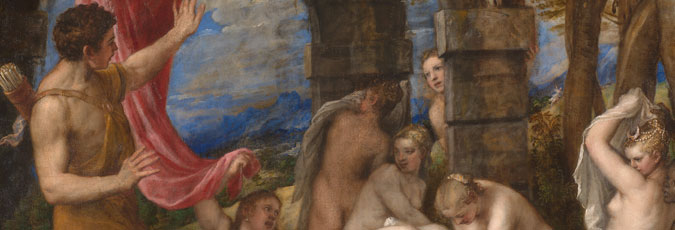Ovid's 'Metamorphoses'
'Metamorphoses' is an epic poem written in Latin by the Roman poet Ovid (43 BC – 17 AD).
It is a collection of mythical tales based on the theme of 'change' – 'metamorphoses' means 'transformations' in Greek. The tales of the 'Metamorphoses' were as well-known as Bible stories in Titian's day and were a popular source of inspiration for many artists during the Renaissance.
The stories behind Titian's paintings
'Metamorphoses' is made up of 15 sections or 'books' and each section has around six stories. In book two we find the story of Callisto and Arcas which inspired Titian's Diana and Callisto. A favourite nymph of the goddess Diana, Callisto is tricked by Jupiter into betraying Diana, and suffers the consequences.
Titian drew inspiration for two other paintings, Diana and Actaeon and the later The Death of Actaeon, from the story of Actaeon found in the third book. The hunter Actaeon sees something he shouldn't – and like Callisto is also punished.
The extracts that follow are taken from the Ted Hughes translation 'Tales from Ovid' (Faber and Faber, 2002).
Read or listen to 'Callisto and Arcas'
Next: 'Actaeon'

